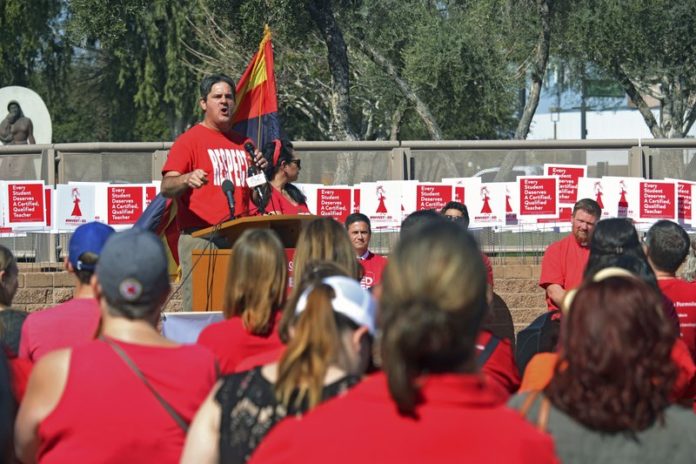
PHOENIX (AP) — About 200 teachers and education advocates who support a proposal to raise taxes on wealthy Arizonans to boost school funding gathered at the Capitol Monday to formally kick off a signature-gathering effort to put the measure on the ballot.
The Invest in Education Act is backed by Arizona’s teachers union and progressive groups and would raise an estimated $940 million a year for schools. The initiative was refiled Friday after what proponents say were relatively minor changes prompted by a Legislative Council review.
Backers need to collect 237,645 valid signatures by July 2 to put the question on the November ballot.
Joe Thomas, president of the Arizona Education Association union, said Republican Gov. Doug Ducey and the GOP-controlled Legislature are continuing to push tax cuts when schools remain underfunded.
“They’re bragging that they’ll gradually bring us back to where we were 12 years ago. And that’s not nearly enough,” Thomas said. “The fallacy of what the governor is doing … is he’s trying to do just enough to make the voters feel like he’s really providing every student in the state with a quality public education, and it’s not. If is was, this wouldn’t be happening.”
The proposed initiative would impose a 3.5 percent income tax surcharge on income above $250,000 for an individual or above $500,000 for couples.
The proposed ballot measure is the latest outgrowth from a teacher strike two years ago that highlighted low wages for educators and a slow rebound from budget cuts enacted during the Great Recession. The walkout secured higher wages for teachers, but many education interest groups said it fell short.
Half of the new tax would be devoted to raises for credentialed teachers, 25 percent to boost wages for cafeteria workers, bus drivers and other support staff, and the rest for teacher training, vocational education and other initiatives.
The initiative comes after a similar effort backed by teachers was tossed from the 2018 ballot when the Arizona Supreme Court ruled that the description of the initiative was misleading.
At the Capitol rally, education supporters in red shirts cheered as they prepared to fan out and collect signatures. Similar kickoff events were planned for Flagstaff and Tucson.
Erik Johnson, a Phoenix high school teacher, said a pay raise teachers won after the 2018 strike helped, but nowhere near enough.
“We’re still, I think, 49th in spending per pupil. We have a hiring crisis because our base pay has gone down,” Johnson said. “Relative to other professions, it’s hard to pull strong young people into education.”
The Legislature has cut taxes regularly over the past 30 years, something education backers point to as one of the reasons for underfunded schools. Several major tax cuts are moving in the Legislature this year as well.
Republican Gov. Doug Ducey has been a vocal opponent of raising income taxes and celebrates restrained spending growth. He drew rousing applause in his annual State of the State speech last month with a pledge to oppose any tax increases. The speech came on the same day the new initiative was initially announced.
“Let me reiterate what I’ve said in five prior State of the State speeches, and two inaugural addresses — because apparently it bears repeating — no new taxes; not this session, not next session; not here in this chamber, not at the ballot box, not on my watch,” Ducey said on Jan. 13.
On Monday, Republican Rep. T.J. Shope said he saw no reason for the tax increase education proponents are pushing, especially with a booming economy that led to big state budgets surpluses in this and the coming fiscal year.
“We have a situation right now where the economy is more diversified than it was 10 years ago when we had the recession, (and) we continue to grow it,” Shope said. “The dollars are going to be there. And you’re going to see that in this year’s budget and going on into the future.”
Republished with the Permission of the Associated Press.












